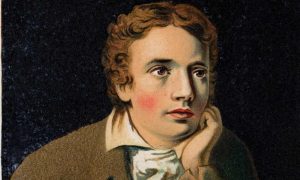We begin the week here on My Poetic Side with a look at a new book which will be published next week which will examine the mistakes in some of the works of the greatest poets.
Even the Greatest Poets Made Mistakes
 To err is indeed a very human trait, so much so that for centuries academics and critics have tried to suggest that the mistakes that have been found in verse are not mistakes, but rather the poet simply exercising literary license that is completely intentional.
To err is indeed a very human trait, so much so that for centuries academics and critics have tried to suggest that the mistakes that have been found in verse are not mistakes, but rather the poet simply exercising literary license that is completely intentional.
However, now, one academic believes these are not intentional acts but simply mistakes.
There is no doubt that those people who enjoy reading poetry prefer to overlook the inconsistencies and cannot bring themselves to believe that such famous poets might have been capable of mistakes however these “poetic errors” have now been collected by Erica McAlpine and put into a book.
An associate professor in English, McAlpine has been spending her time researching the works of at least 30 of the top poets. During the course of her research, she came across several hundred misspellings, grammatical incongruities and factual errors.
Many of these mistakes will come as no surprise to academics, they have been documented before, however previous research into them has led to academics finding deep meaning in the errors and even justifying that they are quite possibly intentional on the behalf of the poet and not in fact mistakes. What McAlpine was hoping to examine was the notion that people believe that the poet was always right and mistakes must have been made for a reason because poetry can mean anything to anyone.
Her book is called “The Poet’s Mistake” and is due to be published next week in the US. Examples of the mistakes that she has used in the book include “On First Looking into Chapman’s Homer” by John Keats. In the sonnet, Keats writes about the discovery of the Pacific by Cortez. However, the discovery was actually made by Balboa. Critics have previously suggested that the mistake on such a historical fact must have been completely deliberate by Keats whilst others have talked about how magical such a mistake is.
Keats wrote the poem in the middle of the night; this fact is well known. It is also understood that had had a copy of “History of America” the 1777 book by William Robertson. The description in the book which is very similar to that written by Keats mentions Balboa. Cortez isn”t mentioned until another part of the book, which does suggest that he mixed the two men up.
McAlpine also looks at the poem “Wordsworth’s Skates” written by Seamus Heaney about the Victorian poet William Wordsworth. The poem was inspired by the image of the poet as a child skating on Lake Windemere. It is well documented that the lake in question is, however, Esthwaite Water.
The book goes on to look at both of these errors and many more in greater detail as McAlpine discusses the possibility that they are not carefully planned mistakes but rather human error.


You must register to comment. Log in or Register.